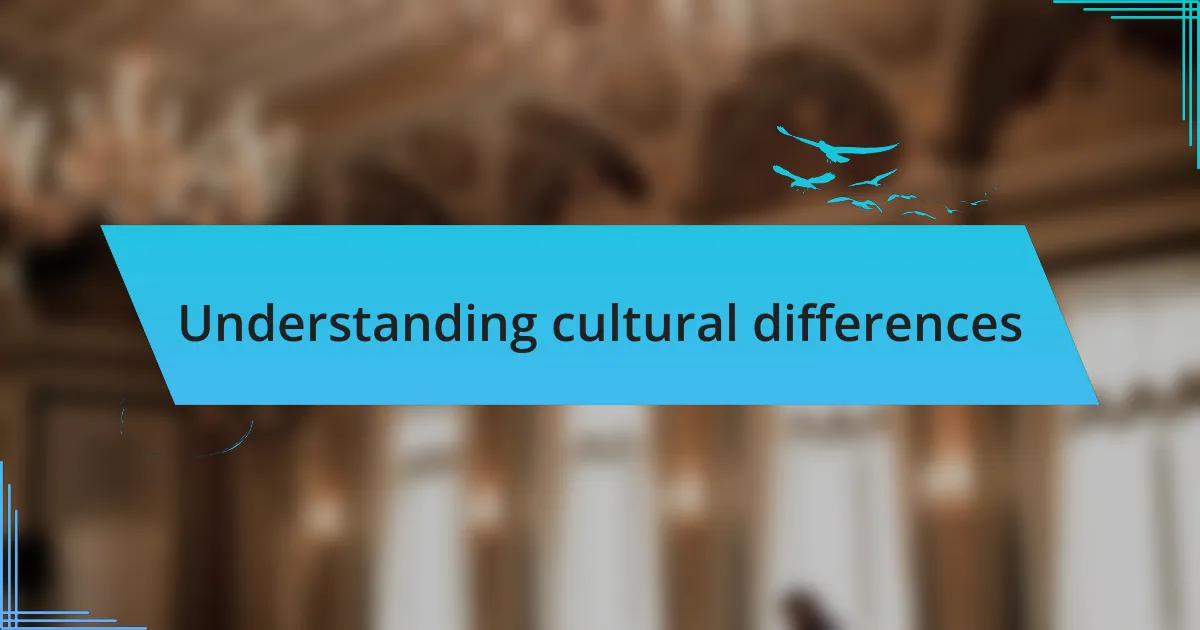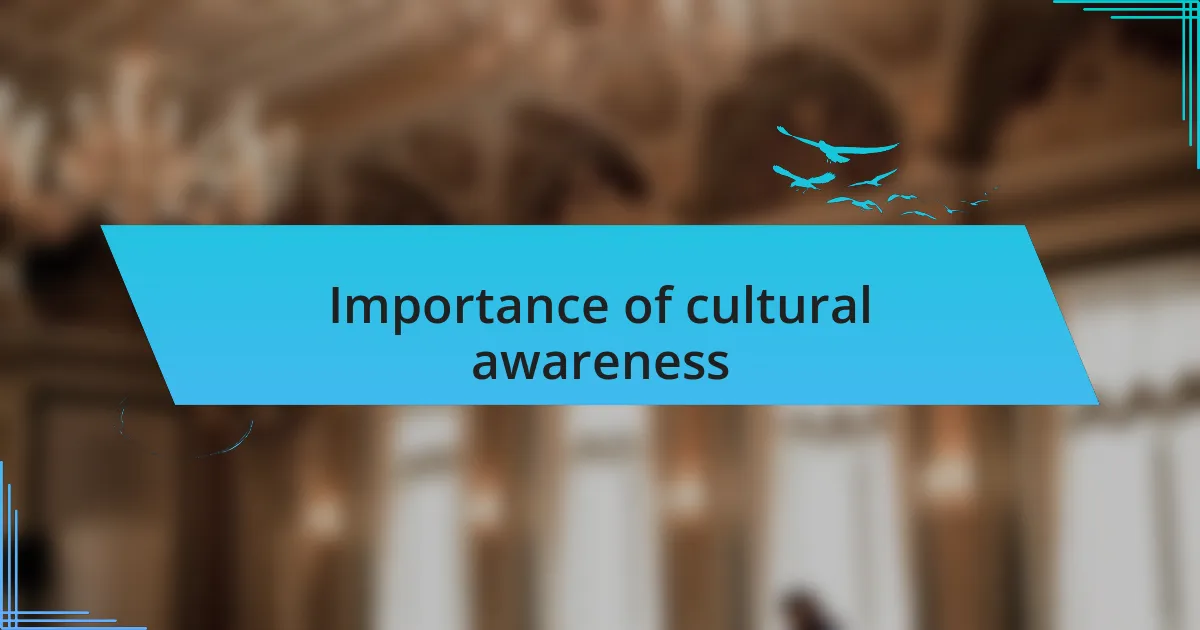Key takeaways:
- Understanding cultural differences enhances interpersonal experiences, particularly in hospitality, by fostering empathy and connection.
- Cultural awareness is crucial for tailoring accommodations and services to guests’ unique backgrounds, improving their overall experience.
- Effective communication and open dialogue are essential for navigating cultural expectations and ensuring guest satisfaction.
- Celebrating diverse cultural events and training staff in cultural competence enriches the hospitality environment and fosters a sense of belonging.

Understanding cultural differences
Understanding cultural differences is like peeling back the layers of an onion; each layer reveals a unique perspective on values, norms, and customs. I remember my first trip abroad, where a simple gesture, like tipping, took on a whole new meaning. In some cultures, it’s a sign of gratitude, while in others, it can be seen as an insult. This experience taught me the importance of being aware of these nuances.
One time, I found myself sharing a meal with locals from Japan, and I was struck by how they approached dining with such reverence. The art of eating isn’t just about the food; it’s about the connection it fosters. When I was offered a dish, I hesitated, thinking I might offend by refusing. It made me realize: how often do we unknowingly dismiss practices that might enrich our experiences?
Every culture tells a story, often through its traditions and behaviors. I learned that asking questions can be an excellent way to bridge gaps. For instance, probing into why my friends celebrated the Lunar New Year with specific rituals not only deepened my understanding but also created a sense of camaraderie. Isn’t it fascinating how curiosity can turn potential misunderstandings into shared moments?

Importance of cultural awareness
Cultural awareness is essential in fostering positive relationships, especially in the hospitality industry. I recall a moment when I was managing a hotel and a guest from the Middle East expressed discomfort with certain Western customs. Understanding the significance of hospitality in their culture allowed me to provide an experience that felt respectful and inclusive. This taught me that empathy and knowledge can turn a potential miscommunication into a memorable stay.
When collaborating with international teams, I’ve noticed that small details, such as greeting customs or meal preferences, hold significant weight. I once awkwardly assumed that everyone loved coffee during a morning meeting, only to find one colleague abstaining for cultural reasons. It struck me how seemingly trivial decisions can shape perceptions and relationships. Being mindful of these elements reflects respect and care for diverse backgrounds.
I sometimes reflect on how much richer my experiences have become through embracing cultural differences. Have you ever noticed how a warm smile or a thoughtful gesture resonates across cultures? This universality reminds me that, while our practices may differ, the desire for connection is something we all share. Cultivating cultural awareness ultimately enriches not just our understanding but also our experiences—both as hosts and as travelers.

Effects on hotel accommodations
When I think about the effects of cultural differences on hotel accommodations, I recall a time when a guest from Japan requested a specific type of room lighting that closely resembled traditional Japanese lanterns. This request highlighted how varying cultural aesthetics can greatly influence satisfaction in hotel stays. It reminded me of the importance of not only meeting but anticipating guest needs based on their cultural backgrounds.
Additionally, I’ve observed how cultural preferences extend into the culinary offerings of a hotel. During one memorable event, we catered to a group of vegetarian guests from India. By learning about their dietary restrictions and preferences, we were able to create an unforgettable dining experience. It made me realize that such thoughtful considerations can transform a standard meal into a celebration of culture.
The atmosphere of a hotel can deeply impact a guest’s experience, which I’ve seen firsthand while designing spaces that reflect diverse cultures. I once arranged a lobby décor that included elements from African art, which resulted in guests from various backgrounds feeling more welcome. Have you ever noticed how a well-curated environment fosters a sense of belonging? It’s these small adjustments that can make your hotel stand out, creating a place where everyone feels at home, regardless of their cultural identity.

Navigating cultural expectations
Navigating the cultural expectations of hotel guests can sometimes feel like walking a tightrope. I remember a time when I encountered a family from Brazil who were surprised by stricter check-in policies. Their vibrant, relaxed demeanor clashed with the formality they faced, leaving them feeling a bit out of place. It made me appreciate how vital it is to understand not only what guests expect from our services, but also the attitudes that shape their experience.
Communication is crucial in bridging cultural gaps; I learned this lesson during a staff training session focused on empathy. One of my colleagues shared how a misunderstanding with a German guest led to a larger issue that could have been avoided with just a few clarifying questions. Since then, I’ve placed extra emphasis on fostering open lines of communication, which ensures that guests feel heard and valued, regardless of where they come from. Wouldn’t it be amazing if every guest felt understood right from the start?
I find that offering culturally relevant amenities can help ease the journey for many travelers. For instance, when working with a group from a predominantly Muslim background, I arranged for prayer mats and ensured halal meal options were available. Witnessing their appreciation reinforced my belief that recognizing and celebrating these differences fosters a sense of belonging. How impactful would it be if all accommodations recognized the cultural nuances that shape guest experiences?

Personal experiences in hospitality
One of my most memorable experiences in hospitality occurred when I hosted a group of Japanese travelers. They had a unique appreciation for detail and politeness that I had not fully anticipated. When they expressed their delight over meticulous room setups, it dawned on me how important attention to such nuanced preferences can be in making guests feel genuinely welcome.
There was also a time when I organized a small event for a group from India. I was taken aback by their warm laughter and the way they engaged with every aspect of their stay. They shared stories about their customs and traditions, which deepened my understanding of hospitality as more than just providing a service; it’s about creating a welcoming space where personal stories can be shared. How often do we miss the opportunity to connect on a human level?
While working with diverse clientele, I learned the importance of adapting my approach. A simple gesture, like greeting a guest in their native language, can go a long way. Once, while checking in a couple from France, their surprise and delight at my attempt to use a few French phrases created an instant connection. It’s fascinating how such small efforts can foster meaningful interactions and make guests feel valued. Wouldn’t you agree that building those connections is what true hospitality is all about?

Strategies for embracing diversity
Embracing diversity in hospitality involves actively seeking to understand different cultural backgrounds. For instance, I remember a time when I attended a seminar on cultural sensitivity tailored for hospitality professionals. That experience opened my eyes to the necessity of knowing various customs and traditions deeply. Have you ever considered how a simple misunderstanding could turn a guest’s delightful stay into a frustrating experience?
Another effective strategy I’ve found is celebrating cultural events in hotels. One year, we hosted a Diwali-themed evening for our Indian guests, complete with traditional food and decorations. The joy in the air was palpable, and it was a wonderful way to engage not just with our guests but also to foster a sense of community among staff members. It made me realize that when we embrace and celebrate diversity, we create a richer environment for everyone involved.
Additionally, I always advocate for training staff in cultural competence. A colleague once shared a story about handling a situation with a guest from the Middle East who preferred more privacy. By respecting their cultural norms, my colleague was able to transform an awkward situation into a positive experience that the guest later praised online. Don’t you think meaningful training can make a significant difference in how we connect with diverse guests?

Lessons learned from my journey
Throughout my journey, I’ve learned that listening is as valuable as speaking. I recall a time when a Chinese guest communicated their preference for quiet during meal times. By simply asking and actively listening, I was able to provide a tailored dining experience that exceeded their expectations. This reinforced for me the importance of open communication; it’s a two-way street that fosters mutual respect and understanding.
Another significant lesson has been the impact of shared experiences. I once joined a local festival with colleagues from various parts of the world, and it felt like a cultural melting pot. Witnessing my peers share their backgrounds while creating connections was inspiring. It reminded me that when we engage with each other’s traditions, we not only broaden our perspectives but also build lasting bonds that enhance teamwork within our hospitality environment.
Finally, patience has emerged as a key virtue in navigating cultural differences. There was a moment when a guest from Japan expressed confusion about certain services, and instead of becoming frustrated, I took the time to clarify everything step by step. My patience paid off; the guest left feeling valued and appreciated. This experience showed me that cultivating patience can transform potential misunderstandings into opportunities for deeper connections. Have you ever thought about how patience can turn challenges into a bridge of understanding?